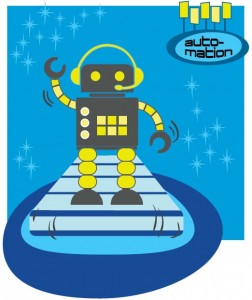The Orbit City Throw Down: Spacely Sprockets Vs. The Contact Center

I’m not exactly a connoisseur of cartoons, but I do have fond memories of Saturday morning cartoons when I was a kid. Since they were only on for a few hours on Saturday mornings in those days rather than the 24/7, 50-channel cartoon tsunami of today, cartoons were something every kid looked forward to on Saturdays. I would get up early to watch as many of them as I could until it was time to go mow lawns. I mowed our front and back lawns as well as the lawns of the elderly couple that lived next door to us every Saturday morning. This lasted until I was 12 years old. That’s when we moved and I started working every Saturday morning from 8 a.m. to noon doing odd jobs for a well-to-do family in the neighborhood. That effectively ended my cartoon-watching career, but not before certain cartoons left their lasting imprint on my young mind. One of those cartoons was “The Jetsons.”
“From the time employees arrive at work and step onto the conveyer belt that takes them straight to their desk… it is apparent that Spacely understands workflow automation.”
“The Jetsons” was a cartoon series that debuted as a Sunday night prime-time TV show in September 1962. While only 24 prime-time episodes originally aired during the 1962–1963 season, it lived on in syndication as a Saturday morning cartoon show for decades. In fact, new episodes of “The Jetsons” were developed and shown from 1985 to 1987. Remarkable as that in itself is, it’s not the reason I consider “The Jetsons” to be one of the most important shows, cartoon or otherwise, on television. It’s not its longevity that sets “The Jetsons” apart; it is its role as a foreshadower of some of the most important innovations in the contact center industry today.
Stay with me here.
Set in Orbit City in the year 2062, the Jetsons live in a world of leisure aided by many labor-saving devices. The Jetsons’ patriarch, George Jetson, works one hour a day, two days a week just as many of us do today (as I write this on a Sunday afternoon). He doesn’t sit in traffic for hours to get to work; he hops in his aerocar and is dispatched posthaste to his place of employment, Spacely Space Sprockets. In one of the first parallels I noticed between “The Jetsons” television show and the reality of today’s contact center industry, George has a job that is never really clearly defined, he doesn’t really do much, and he is often promoted to vice president. Once he is promoted, his incompetence often becomes apparent resulting in his demotion. Then he does some sort of tap dance around a solution or something that no one at Spacely Sprockets really understands and he is promoted to vice president again. Sound familiar?
In terms of productivity, the contact center industry owes a true debt of gratitude to George’s boss and the owner of Spacely Space Sprockets, Cosmo Spacely. Mr. Spacely’s business is an automation wonderland. Mr. Spacely is one of the techno- geniuses behind the explosive technological advances that allow George Jetson and the other employees of Spacely Space Sprockets to live their leisurely life in Orbit City. He also understands how to compete effectively against his business arch-rival, Cogswell Cogs.
The way Mr. Spacely keeps his business competitive is through workflow automation. From the time employees arrive at work and step onto the conveyer belt that takes them straight to their desk, with no coffee, restroom or gossip stops on the way, to the way in which employees are best utilized in the design and manufacture of Mr. Spacely’s sprockets, it is apparent that Spacely understands workflow automation.
While contact center professionals still have to use their legs rather than a conveyer belt to get to their desks each day, we are beginning to see more parallels between the world of Spacely Sprockets and the conte mporary contact center. The benefits of workflow automation are not lost on today’s customer service professional. Enabled by innovations in speech analytics, we are finding that technology is replacing many routine manual tasks and positively impacting productivity and job satisfaction in the contact center.
mporary contact center. The benefits of workflow automation are not lost on today’s customer service professional. Enabled by innovations in speech analytics, we are finding that technology is replacing many routine manual tasks and positively impacting productivity and job satisfaction in the contact center.
According to Nexidia’s Vice President of Marketing Jon Harmer, “Advances in workflow management and real-time analytics are allowing contact centers the ability to automate processes such as compliance and quality control that had previously been solely manual. The upshot for companies is that being able to leverage these advances allows managers to easily identify those agents who are working the most effectively, and create a set of best practices based on their work.”
Managers can then seamlessly integrate those practices into the routine of the struggling agents, bringing up the overall performance rate of the contact center. “The result,” Harmer says, “is that the automation of this entire process allows the quality assurance manager to focus less on the day-to-day quality control maintenance and more on what’s most important: coaching the agents who need the most help.”
While we haven’t yet matched the 2062 world of automated convenience and leisure in which George Jetson lives, solutions such as speech analytics are pushing the envelope in terms of improving life in the contact center for those who choose customer service as a profession. We still have 47 years to catch up before the throw down in Orbit City, but given the workflow automation strides that are being accomplished in the contact center today, I think Mr. Spacely would be impressed.
PAUL STOCKFORD is Chief Analyst at Saddletree Research, which specializes in contact centers & customer service.
– Reprinted with permission from Contact Center Pipeline, http://www.contactcenterpipeline.com




